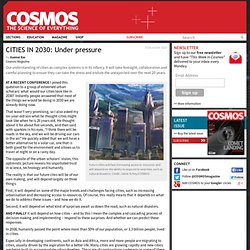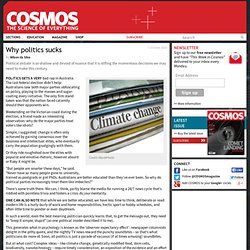

The science of everything. A shadow biosphere. The Atacama Desert in Chile could potentially be home to some pretty 'weird' life.

Credit: iStockPhoto If life started more than once on Earth, we could be virtually certain that the universe is teeming with it. Unless there is something very peculiar about our planet, it is inconceivable that life would have begun twice on one Earth-like planet but hardly ever on all the rest. Until recently, biologists assumed that all life on Earth is of the same origin, with every organism that ever lived descended from a common genesis. But how do we know that is so?
When I began mulling these ideas a few years ago, I was amazed nobody had really thought much about evidence for multiple genesis events. I did, however, find enough open-minded scientists to attend a workshop at Arizona State University in December 2006 and brainstorm a few ideas. In order to do this, we first have to understand why biologists think all known life shares a common origin.
At least, that has been the experience so far. A cure for AIDS? The HIV virus (purple) selectively attacks white blood cells (T-cells) called CD4s (blue), which have a receptor called CD4 on their surface.

Credit: iStockphoto IN AN AGEING research building at the University of Southern California, a US$14.5 million biomedical experiment is under way that until a few years ago would have made many AIDS researchers snicker at its ambition. Mice are the main research subjects (for now), and some 300 of them live in a room the size of a large walk-in wardrobe. Signs plastered to the room’s outer door include blaze-orange international biohazard symbols and a blunter warning that says, “This Room Contains: HIV-1 Infected Animals.” Yet the hazard is accompanied by an astonishing hope.
ENERGY IN 2030: A real turn on. The Dukovany Nuclear Power Station in the Czech Republic.

Credit: Wikimedia We take energy for granted. Do you think about where the energy comes from when you flick on the lights or TV, crank up the air conditioner or turn on the cooking hotplates? More pervasively, a vast amount of energy goes into delivering your food, clothing and manufactured goods. Energy also allows you to travel rapidly from place to place, by car, rail or plane. It is no exaggeration to say that cheap and readily available energy constitutes the most fundamental basis of our economy. The way we are generating our energy is unsustainable – both environmentally and economically. This was a Faustian bargain, and now the devil is due.
The next 20 years will be a defining moment in world history. Either way, by 2030, we’ll very likely know whether we’ve collectively been able to chart the right course. Worldwide, a variety of important energy choices will be made during this next decade. This must be phased out. CITIES IN 2030: Under pressure. Future cities will face decreasing access to resources and will depend on the ability to respond to surprises, such as natural disasters.

Credit: Jamie Tufrey/COSMOS At a recent conference I posed this question to a group of esteemed urban scholars: what would our cities look like in 2030? Instantly people answered that most of the things we would be doing in 2030 we are already doing now. That wasn’t very promising, so I also asked my six-year-old son what he thought cities might look like when he is 26 years old. He thought about it for about five seconds, and then said with sparkles in his eyes, “I think there will be roads in the sky, and we will be driving our cars in the air.” The opposite of the urban scholars’ vision, this optimistic picture reveals his unpolluted trust in science, technology and humanity. Why politics sucks. Credit: iStockPhoto POLITICS GETS A VERY bad rap in Australia.

The last federal election didn’t help: Australians saw both major parties obfuscating on policy, playing to the masses and sugar-coating every initiative. The only firm stand taken was that the nation faced calamity should their opponents win. Weekending on the Victorian coast during the election, a friend made an interesting observation: why do the major parties treat voters like idiots? Simple, I suggested: change is often only achieved by gaining consensus over the business and intellectual elites, who eventually carry the population grudgingly with them. Or they ride roughshod over the elites with populist and emotive rhetoric, however absurd or flaky it might be. “But people are smarter these days,” he said. There’s some truth there. In such a world, even the best meaning politician quickly learns that, to get the message out, they need to “keep it simple, stupid” (as one political insider described it to me).